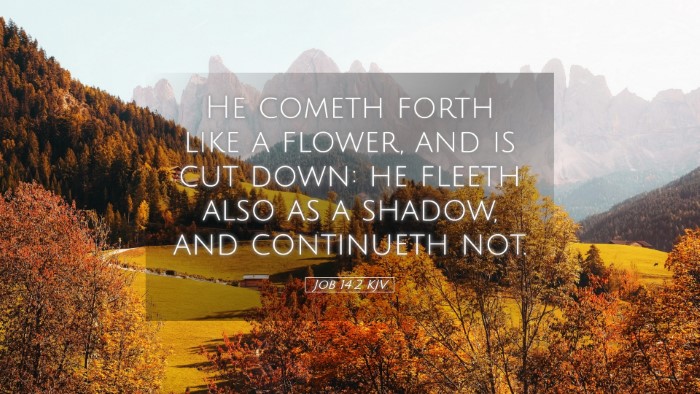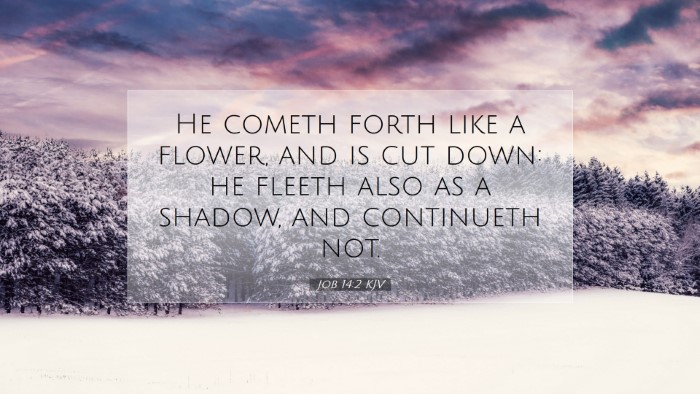Old Testament
Genesis Exodus Leviticus Numbers Deuteronomy Joshua Judges Ruth 1 Samuel 2 Samuel 1 Kings 2 Kings 1 Chronicles 2 Chronicles Ezra Nehemiah Esther Job Psalms Proverbs Ecclesiastes Song of Solomon Isaiah Jeremiah Lamentations Ezekiel Daniel Hosea Joel Amos Obadiah Jonah Micah Nahum Habakkuk Zephaniah Haggai Zechariah MalachiJob 14:2
Job 14:2 KJV
He cometh forth like a flower, and is cut down: he fleeth also as a shadow, and continueth not.
Job 14:2 Bible Commentary
Commentary on Job 14:2
Verse: "He cometh forth like a flower, and is cut down: he fleeth also as a shadow, and continueth not."
Overview
This poignant verse from the Book of Job captures the fleeting nature of human life, emphasizing both its fragility and brevity. The metaphors of a flower and a shadow illustrate the inevitability of mortality. As believers and scholars reflect on this verse, it serves as a vital reminder of human limitations and the transient nature of existence.
Insights from Public Domain Commentaries
Matthew Henry's Commentary
Nature of Life: Matthew Henry identifies the imagery of the flower as a reminder of life's beauty and brevity. He notes that a flower blooms beautifully but is cut down swiftly, symbolizing human mortality. Just as flowers bring joy and beauty to the world temporarily, so do human lives.
Life as a Shadow: Henry highlights the metaphor of life as a shadow which quickly fades away. Shadows lack substance, representing the elusive and insubstantial nature of human endeavors. He emphasizes that life is brief, which should prompt individuals to reflect on their purpose and the lasting impact they wish to leave behind.
Albert Barnes' Notes on the Bible
Transience of Existence: Barnes discusses the essential theme of mortality in this verse. He points out that the comparison to a flower stresses the beauty of life but also its fragility. He notes that outward splendor is no safeguard against the reality of death.
Philosophical Reflection: Barnes advocates that this verse reflects Job's deep understanding of the human condition. Job employs these images to engage in a philosophical discourse on life’s purpose and the fleeting moments. He suggests that believers must accept the fragility of life and find comfort in knowing there is a higher purpose beyond death.
Adam Clarke's Commentary
Symbolism of the Flower and the Shadow: Clarke provides keen insights into the significance of each symbol used in the verse. He elucidates the notion that the flower, which represents beauty and promise, is destined to wither. This serves as a powerful metaphor for how quickly life can change, reinforcing the message that one should cherish each moment.
Implications for Faith: Clarke emphasizes the spiritual implications of this verse. He notes that while life is ephemeral, it should lead believers to seek deeper spiritual truths and eternal salvation. He encourages Christians to ponder the fleeting nature of life and to invest their energies in pursuits that have lasting spiritual significance.
Theological Reflections
This verse prompts critical reflections on the nature of existence, suffering, and mortality from a theological perspective. It invites discussion on the following themes:
- Human Mortality: Recognizing the temporary nature of life encourages humility and an acknowledgment of one’s limitations.
- Divine Sovereignty: The recognition of life’s fragility invites believers to submit to God’s will and to trust in His eternal plan.
- Hope in Suffering: For those experiencing loss or hardship, Job 14:2 can be a source of comfort, reminding them that life’s challenges are temporary, while spiritual truths and God’s promises endure forever.
Conclusion
Job 14:2 serves as a profound reminder of the transient nature of life. By drawing upon insights from Matthew Henry, Albert Barnes, and Adam Clarke, we are encouraged to reflect deeply on our existence. Understanding life as a fleeting moment allows us to appreciate its beauty while propelling us toward meaningful spiritual pursuits. This verse calls believers to cherish life and to cultivate faith, hope, and the pursuit of eternal significance amidst the shadows of human existence.


